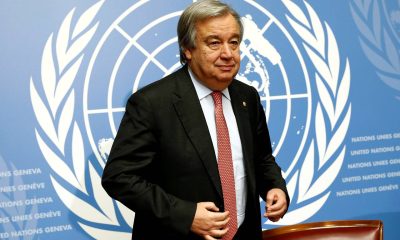FOREIGN NEWS
UN Women Asks For Prioritisation Of Funding For War Against SGBV
United Nations Women has called for prioritisation of investment by all stakeholders in financing development plans towards ending violence against women and girls, even as it pleaded for strategic policy development aimed at putting a stop to the scourge.
The call was made at the weekend by the UN Women Deputy Country Representative to Nigeria. Mr. Lansana Wonneh at a Joint Symposium on Prevention of Violence Against Special Need Groups in Nigeria; with the theme: “Tackling Multi-forms of Vulnerability and Violence through Improved Policies, Programmatic and Funding Mechanisms”.
Wonneh, who was represented by the National Programme Officer UN Women, Mrs. Patience Ekeoba, said that despite many countries passing laws to combat violence against women, weak enforcement and discriminatory social norms remain significant problems.
He said: “Being able to stop violence from occurring in the first place is critical to achieving the goal of ending violence against women and girls (VAWG) because if violence does not occur all the other GBV responses will not be necessary. VAWG is preventable; we need to continue to invest in transforming social norms, addressing unequal gender power relations, strengthening essential services for survivors, and enabling safer environments. I call for more attention to gender-responsive budgeting, ensuring that budget circulars have definite allocations to gender equality and women empowerment including the budget for addressing violence against women and girls.”
Wonneh explained that women with special needs and other groups experience violence differently because of their vulnerability and special needs, hence the need for stakeholder engagements to mobilize support and raise awareness to end the menace.
He added: “The symposium provides an opportunity for ASWHAN and the other special needs groups to share their experiences of violence, their survivor stories and make demand for increased prevention interventions and response. It will also allow all relevant government agencies, the UN System, development partners, and civil society to gather here today to listen, discuss, and advance prevention strategies and funding mechanisms to enhance prevention and mitigation services and actions for the target groups. So I call on you to participate actively so that at the end of today’s interactions we will all come up with practical strategies towards reducing and eliminating violence that affects these critical groups in our society.”
Also speaking, the Acting Director, Policy Planning and Coordination, Nation Agency for the Control Aids (NACA), Dr. Yinka Anoemuah, noted that the agency will continue to work with partners to achieve the desired goal of ending all forms of violence.
“We have so many vulnerable populations that experience vulnerabilities and that is why we will continue to partner with the UN system and partners to find ways to bring an end to all the challenges that people are facing in the communities. We recognize very much the relationships between Gender Violence (GBV) and HIV, and that is why the key area of strategic engagement that we have had over the years is if we want to control the virus and end the epidemy by 2030, we need to bring to a stop all forms of violence, be it emotional, psychological, physical, then we have to work together to make that happen. Without resources, without people, without investment, we will not be able to do it, but with collaborations and partnerships we will achieve a lot”. She noted
On behalf of people with disabilities, the President of Women With Disabilities, Lois Auta, called for an increase in budget allocation on disability issues.
“Women with disabilities are much more vulnerable to issues of GBV, this violence could be in different forms such as issues of economic empowerment, issues of health, issues of institutional barriers, and infrastructural Barriers. We have legal frameworks and these frameworks are not implemented. The big issue is the lack of funding, with the need to come together and collaborate and activate goal 17 of SDG, by working together. We need to insert a budget plan in all the MDAs for issues of women and girls with disabilities.
She said: “We need to talk to the National Assembly to increase the budget allocation on issues of disability as well as increase awareness on GBV in the rural areas.”
According to the Head Health Desk, Ministry of Women Affairs, Mrs Marian Shuaibu, the ministry takes priority in the wellbeing of all women. Noting that approval to establish a mobile court to deal with the perpetrators of GBV has been gotten, as well as the development of a policy on mental health.
This year’s theme, “Unite!; Invest to Prevent Violence Against Women & Girls” is apt as it focuses on investment and financing of strategies and programmes that will help prevent violence from happening the first place against women and girls.
The symposium was put together by UN Women, NACA, UNAIDS, the Association of Women with HIV/AIDS in Nigeria, (ASWHAN), and the Ministry of Women Affairs.
-
CRIME3 years ago
PSC Dismisses DCP Abba Kyari, To Be Prosecuted Over Alleged $1.1m Fraud
-
FEATURED3 years ago
2022 Will Brighten Possibility Of Osinbajo Presidency, Says TPP
-
FEATURED2 years ago
Buhari’s Ministers, CEOs Should Be Held Accountable Along With Emefiele, Says Timi Frank
-
BUSINESS & ECONOMY2 years ago
Oyedemi Reigns As 2023’s Real Estate Humanitarian Of The Year
-
SPORTS1 year ago
BREAKING: Jürgen Klopp Quits Liverpool As Manager At End Of Season
-
SPORTS2 years ago
Could Liverpool Afford Kylian Mbappe For €200 million? Wages, Transfer Fee
-
ENTERTAINMENT2 years ago
Veteran Nigerian Musician, Basil Akalonu Dies At 72
-
FEATURED2 years ago
Tribunal Judgement: Peter Obi Warns Of Vanishing Electoral Jurisprudence, Heads To Supreme Court
-
BUSINESS & ECONOMY2 years ago
Oyedemi Bags ‘Next Bulls Award’ As BusinessDay Celebrates Top 25 CEOs/ Business Leaders
-
FEATURED3 years ago
2023 Presidency: South East PDP Aspirants Unite, Demand Party Ticket For Zone



































